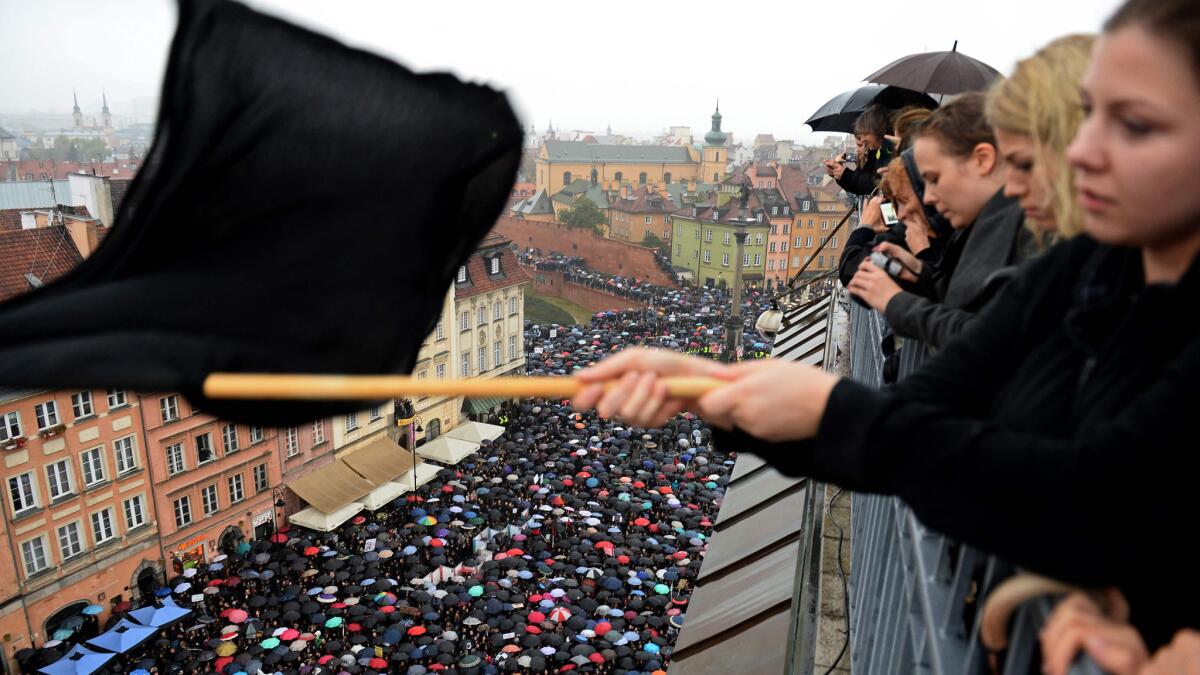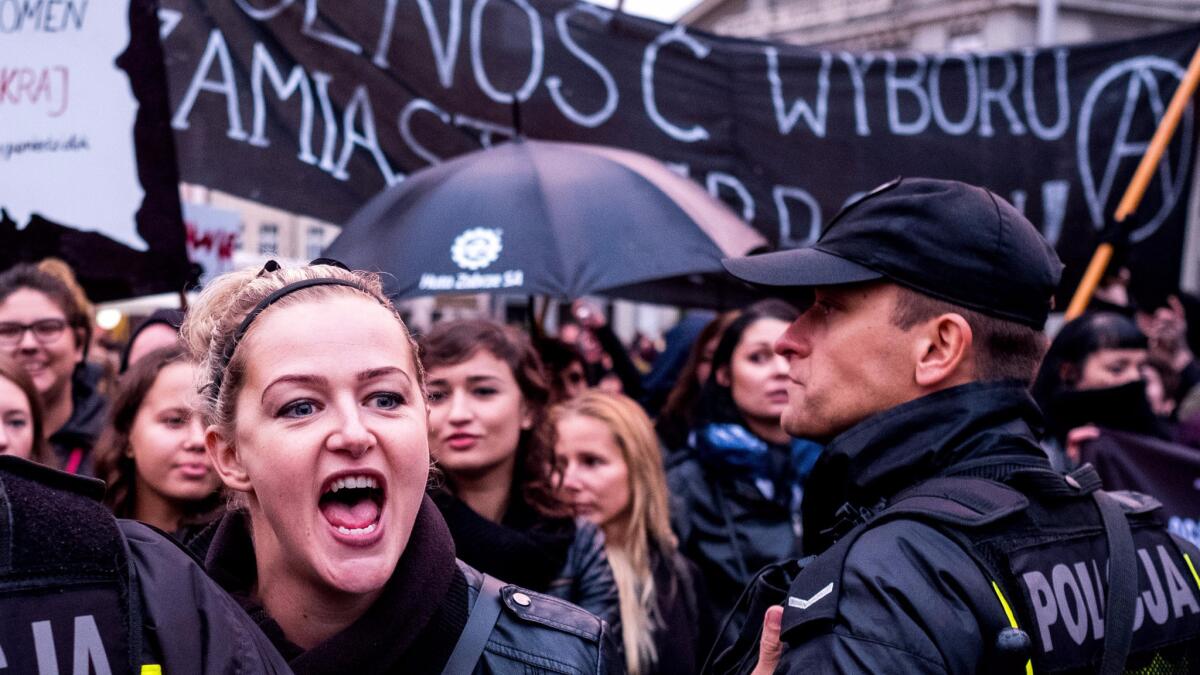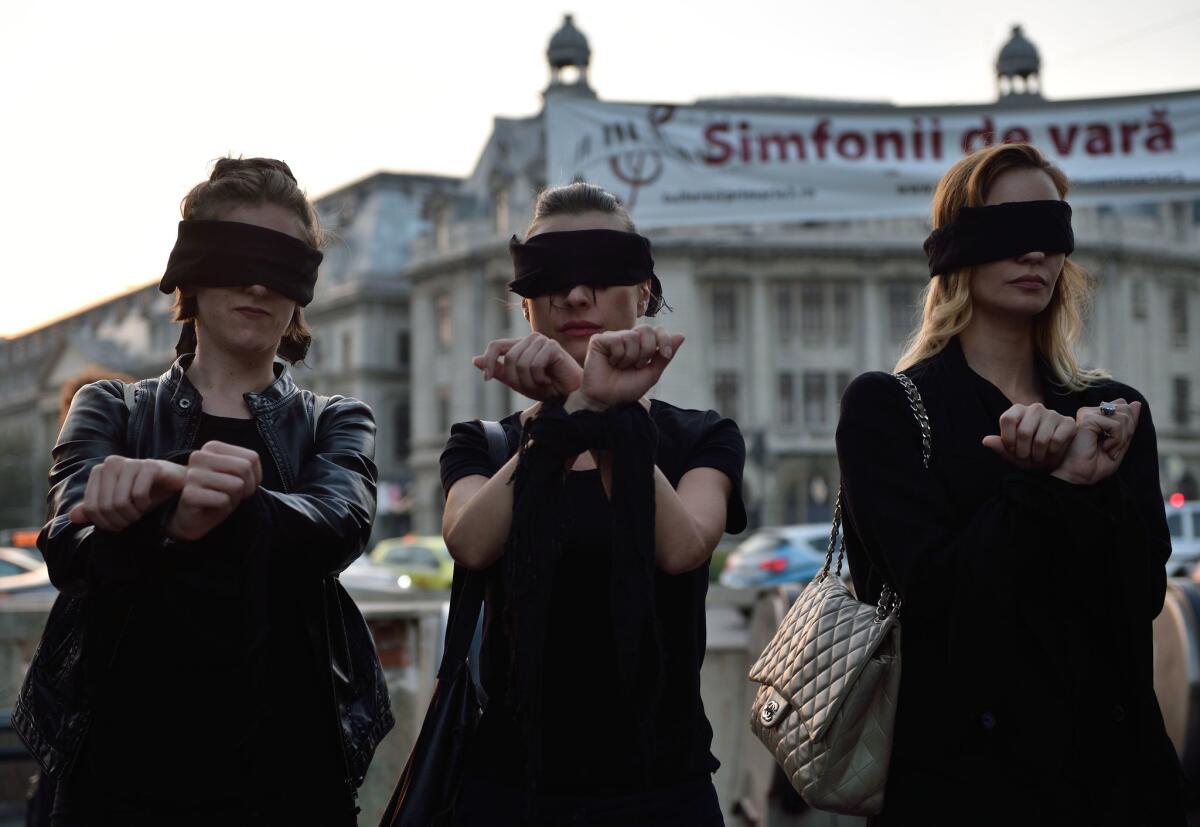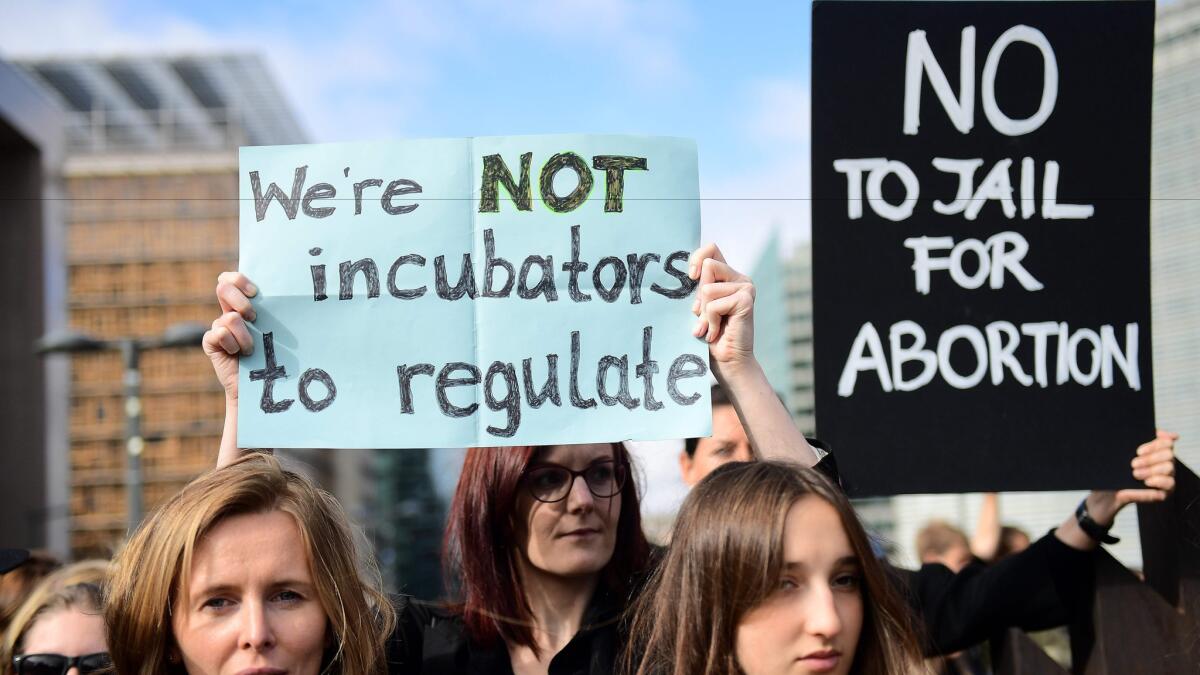Polish women protest proposal to ban abortions in almost all cases

- Share via
Thousands of women took to the streets of Poland to protest a proposed law that would almost totally ban abortions in this strictly Catholic country.
Wearing black, linking arms and marching under the banner #CzarnyProtest, or Black Protest, abortion rights activists on Monday also used social media to urge women across this nation of 38 million people to stay off the job, out of school and refrain from domestic duties.
According to AFP, the action was inspired by a women’s strike in Iceland in 1975, where demonstrators demanded equal rights for women in an endeavor that paved the way for landmark legislation on gender parity.
The outrage centers on a bill that would allow pregnancies to be terminated only if the mother’s life was at risk. The new law would criminalize abortion, and women who undergo an abortion and doctors who perform them could face up to five years in prison, according to media reports.

“Poland’s abortion law is already one of the most restrictive in Europe and these proposals are an all-out assault on women and girls and their right to make decisions about their own bodies,” Kasia Staszewska, director of Amnesty International UK’s Women’s Rights program, said in a statement.
“A woman who needs an abortion is not a criminal, and decisions about her body and her health should never be placed in the hands of politicians,” Staszewska said.
The European Parliament is expected to debate reproductive rights in Poland later this week, much to the disdain of Polish Prime Minister Beata Szydło, according to Radio Poland.
What’s the history of abortion in Poland and what does the current law say?
According to the United Nation Secretariat’s Population Policy Data Bank, Poland generally banned abortion until 1932 when the law was modified to allow abortion when a pregnancy endangered the life or health of the woman or resulted from a crime, such as rape or incest.
In 1956, abortion laws were further liberalized permitting abortion on medical grounds, if the pregnancy resulted from a criminal act or because of “difficult living conditions,” according to the U.N.’s Population Policy Data Bank.
In 1993, the Polish Parliament further restricted access to abortion by eliminating the “difficult living conditions” provision, according to the U.N. This resulted in the current law, which bans the termination of all pregnancies unless they result from rape or incest, pose a health risk to the mother, or the fetus is severely deformed.
What’s the general feeling among polls?
According to the Guardian newspaper, a poll published in September by the Newsweek Polska magazine found that 74% of Poles want to keep the existing law.
Less than 2,000 legal abortions are performed annually in Poland, according to the newspaper. But an additional 100,000 to 150,000 abortions are performed illegally or abroad on Polish women, the paper reported citing women’s groups.

“It also won’t stop abortions but just push them into back alleys and bathrooms, where the risks of long-term damage and death multiply,” Hillary Margolis, a researcher for the Women's Rights Division wrote in a recent dispatch on the agency’s website criticizing the proposed law.
But not everyone is convinced, or cares. Stop Abortion, the main group seeking stricter abortion laws in Poland, wants “a total ban with no exceptions even if the life or well-being of the mother is endangered,” according to the Guardian. According to the paper, the group’s petition calling for a ban on abortion attracted 450,000 signatures.
The proposed legislation also has the blessing of Poland’s powerful Catholic Church, although its bishops have since opposed jailing women who receive abortions, the Associated Press reported.
How does Poland’s abortion law compare with other European countries?
According to the website abortion-clinics.eu, terminating a pregnancy is legal in nearly every European country and most allow abortion on demand during the first trimester. But “there is a wide variation in the restrictions under which it is permitted,” the website says.
Denmark allows abortion after the first trimester for a variety of reasons, including socioeconomic cause, but authorization is required for such an abortion, the website says.

Malta is the only European country that bans abortion in all cases, not even allowing an exception when the woman’s life is in danger, according to abortion-clincs.eu. In Ireland and Andorra, abortion is illegal with the exception of cases in which a woman’s life is endangered by continuing her pregnancy, the website says.
Poland is the only former European communist country that doesn’t have liberal abortion laws, according to abortion-clinics.eu.
Support for Polish women from around the world
Monday’s protest in Poland, where 60 cities were reported to have participated in the action, garnered support from around the world — from England and Ireland to Taiwan, France and Russia. And the Twittersphere was ablaze with tweets, vines and photos like these:
For more on global development news follow me @AMSimmons1 on Twitter
ALSO
U.S. breaks off diplomatic talks with Russia to end bloodshed in Syria
After defeat of the FARC peace deal, Colombians wonder what's next
Wealthy nations could do more to help alleviate the global refugee crisis, new report says
Sign up for Essential California
The most important California stories and recommendations in your inbox every morning.
You may occasionally receive promotional content from the Los Angeles Times.








